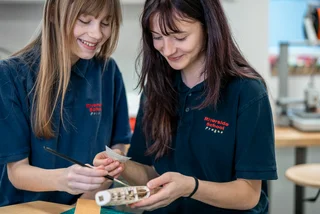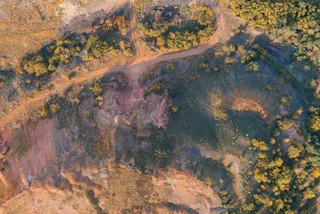Written by David Creighton
for Expats.cz
From digging up camels in Hungary to advising clients about environmental policies in the Czech Republic, Briton Alastair Millar (34) has certainly had what human resources advisers would call a ‘varied career´. He first came to the Czech Republic 1991. 14 years later, a successful independent translator & consultant.
PARTNER ARTICLE
Throughout his career, both as an employee and as a self-employed businessman, he has realized the importance of thinking ahead and learning new things.
His story begins with an honours degree in archaeology at the University of London. A fieldwork requirement led Millar to work in Czechoslovakia, as it was then, in the early 1990s. “It was very cheap, so it made sense to come out here and stretch the grant as much as possible, ” he says, adding: “It was all good experience, and I got good value out of it.”
Millar subsequently moved out to the Czech Republic in 1994. He took up a position with the Academy of Sciences, later moving to a management post with the KAP environmental consultancy. He subsequently changed career direction, taking up a purchasing manager´s job with Datart. “I wanted to improve my negotiation skills, so this was very much ‘in at the deep end´, “ says Millar, arguing that although it was a baptism of fire it was ultimately worth it.
A period of convalescence while at Datart led him to re-evaluate his career path, and Millar decided to “go back to his roots”. He then started to build up a network of clients by translating texts relating to archaeology and heritage. Skills learned while working for KAP and Datart were put to good use to provide heritage consultancy services, which is what he does today, as well as continuing to translate. Within two years of going freelance he´d become the leading Czech-English translator in his field, and he has successfully maintained this position.
Millar has a Czech wife, whom he met even before his archaeology degree; he married shortly after emigrating to the Czech Republic in 1994. He has two children aged 10 and 7, who are being brought up to speak both Czech and English. “We´re a bilingual household, “ Millar says. They live in Roudnice nad Labem, a small town on the main Prague to Dresden railway line in North Bohemia.
10 TIPS FOR LIVING AND DOING BUSINESS
IN THE CZECH REPUBLIC
Eleven years of living in the Czech Republic have given Alastair Millar an excellent insight into Czech life and business. His perspective is particularly useful because he lives outside Prague – he understands living away from the capital, and the advantages and disadvantages this brings. This insight is reflected in some of the advice below.
Life is easier if you speak Czech
It may seem obvious, but this is an issue that is so often overlooked, argues Millar. According to him it´s easy to fall into the trap of not doing so, in Prague in particular. “I assure you that I wouldn´t be where I am now without learning Czech, “ he says. “If you´re planning to stay for the long haul then you should learn the language.” This is particularly important if you´re living outside the capital or if you´re setting up your own business. “Working for a big company gives you a safety net. When you work for yourself you don´t have that – you´re on your own, “ he says.
Millar also advises that life outside Prague can be more difficult because even if you speak the language well, there are always some people who will pretend that they don´t understand you. His advice is to carry on regardless.
Bureaucracy can be intimidating, but if you live outside Prague it can be less so
A key example of where language skills can come in handy is in dealing with officials. “Outside Prague the bureaucracy is somewhat less forbidding and less formidable than it is in the capital – if you speak Czech,” he says. Offices will tend to be more approachable if you speak the language. “People appreciate the effort of someone trying to speak Czech, at least the bureaucrats do, “ he says.”
An advantage of dealing with a bureaucracy outside the capital is that it is not as “swamped” as offices in the capital, and people have more time to deal with you, says Millar, noting that being a foreigner makes you ‘exotic´. As a foreigner outside the city you´re more of a rare bird. “In Prague, if you´re a foreigner you´re a nuisance; elsewhere if you´re a Western European you´re interesting, “ he says, noting that this is the case even if you just live outside the city, such as in Prague West District. He cites the foreigner´s police for Prague West, where “they were actually upset for me if I didn´t have a particular document. Do you think that they would be like that at the main foreigner´s police office at Olšanská?“
Politeness never costs anything when dealing with officials
Czech bureaucracy has a notorious reputation among expats. But many officials can be very pleasant, and if you approach them properly this can go a long way. “As in any bureaucracy, you have to know how to approach people with the right degree of humility, “ argues Millar, adding: “you should make it clear that you don´t think that they are a bunch of idiots.”
It´s a question of basic people skills he says. “You have to be unfailingly polite, no matter how rude they are to you (if they are rude to you). Make it clear that you understand where they´re coming from.” Millar also advises that you make it clear to officials that you know that they´re the experts, and you should always ask them (politely) what you should do.
Don´t consider bribery
“Do it once, and you´ll be expected to do it every time. I´ve never offered a bribe to government officials or anyone else in this country, and it´s never been suggested that I do so, “ says Millar, who stresses that he´s never had any problems sorting out the paperwork he needs. He explains that the reason for this is that “I treat people with respect. I treat them like human beings – irrespective of what I might actually be feeling”.
The small business environment should improve
“Over the last few years the government has not been particularly small business friendly, shall we say,” argues Millar, noting that small business needs have tended to be overlooked. He is, however, optimistic that things will improve, with the proposed new tax laws a big step forward for SMEs. But there are still threats. “The biggest danger is that the government will not realize how difficult it is for small businesses and not ease up on them, despite the fact that small businesses are the engine-room of the economy, “ Millar explains.
Remember that there are still opportunities
“There are still lots of opportunities in this country, “ argues Alastair Millar. “It´s still a developing economy; it´s not yet a convenience-based economy, “ he adds. Although the rate of change is not as fast as it used to be and the opportunities are more limited, they are still there for foreigners if they look hard enough.
Remember the importance of personal recommendation
In his early freelance days Millar acquired a number of clients through a fellow Briton, another expat, who was returning to the UK. The quality of his work led customers to tell others about him, and ended up having to little actual marketing. “Frankly, personal recommendation is by far the best way of getting new business, “ he says. Millar argues that advertising is necessary at the beginning so that a name is recognizable, but notes that most of his new clients come from recommendations.
Get used to saying goodbye on a frequent basis
One thing you have to get used to is that so many expats are leaving all the time. “You get very used to waving people off at the airport, ” says Millar, who says that among Britons in particular there seem to be very few who are here for the duration.
Cultural awareness should take account of Czech history
Millar reckons that to understand Czechs´ attitudes to foreigners, it´s worth looking at their history. “For centuries the Czechs were dominated by the Hapsburgs or the Soviet Union. Of course the experience influences how they see other nationalities today, “ says Millar.
Consider living outside the city if you don´t need
to be based in Prague
A commuter belt is slowly developing around Prague. Roudnice, where Alastair Millar lives, is only 25 minutes from Prague by car. Although property prices are going up in Central Bohemia and beyond, prices are still much lower than in Prague. Millar suggests that living outside the city has definite advantages, such as those listed above. And if you work ‘virtually´ – doing jobs such as translation – then there is no need to live in Prague at all.
David Creighton can be reached at creighton@expats.cz












 Reading time: 7 minutes
Reading time: 7 minutes 


















